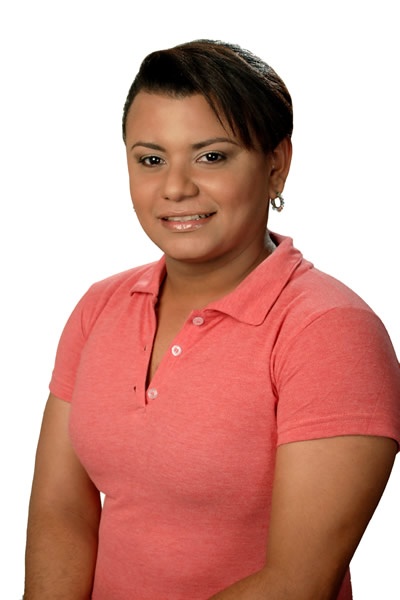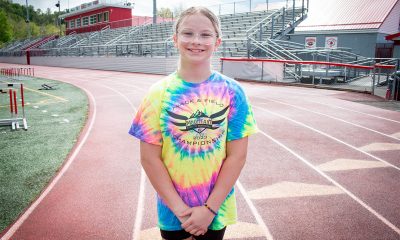News
30 Colombian LGBT advocates attend USAID-backed training
Program seeks to promote greater involvement in country’s politics
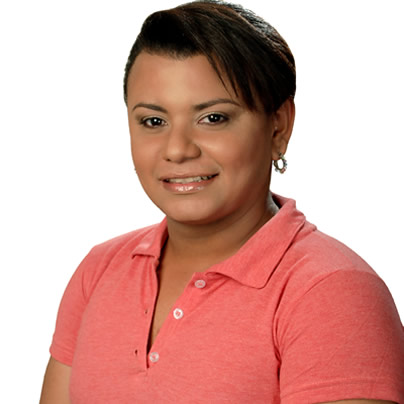
Thirty activists from across Colombia are attending a four-day training in the city of Cartagena designed to encourage LGBT people to become more involved in the country’s political process.
The program, which the Gay and Lesbian Victory Institute and the Colombian LGBT advocacy groups Caribe Afirmativo and Colombia Diversa organized, is the second to take place in the South American country as part of the USAID-backed LGBT Global Development Partnership that will contribute $11 million over the next four years to advocacy groups in Ecuador and other developing countries. Thirty activists attended the initiative’s first Colombia training that took place in Bogotá, the country’s capital, from May 30 – June 2.
Denis Dison of the Gay and Lesbian Victory Institute; Claire Lucas of USAID; National Democratic Institute Director Francisco Herrero and Tatiana Piñeros, a transgender woman who runs Bogotá’s social welfare agency, are among those who took part in a panel on Thursday that Colombia Diversa Executive Director Marcela Sánchez moderated on how out political leaders and officials can advance the Colombian and American LGBT rights movements. Jhosselyn Pájaro, a trans woman who ran for municipal council in the city of Arjona outside of Cartagena; Ramón Rojas, a councilman in the city of Chaparral in central Colombia and María Rachid, an Argentine lawmaker and LGBT rights advocate who led campaigns in support of the country’s same-sex marriage and trans rights laws that took effect in 2010 and 2012, also spoke.
“I will have the opportunity to build my capacity and be able to realize a good and better platform in regards to the next campaign,” Pájaro told the Washington Blade before the Cartagena training began. “To know how to implement a good strategy that will allow me to reach my voters is something that excites me greatly.”
The training is taking place roughly five weeks after two gay men in Bogotá became the country’s first legally recognized same-sex couple.
Colombia’s Constitutional Court in 2011 ruled gays and lesbians could seek legal recognition of their relationships within two years if lawmakers in the South American country failed to extend to them the same benefits heterosexuals receive through marriage.
The Colombian Senate in April overwhelmingly rejected a bill that would have extended marriage rights to gays and lesbians.
The Constitutional Court’s June 20 deadline passed amid lingering confusion as to whether same-sex couples could actually marry in Colombia because the 2011 ruling did not contain the word “marriage.”
Sánchez and other LGBT rights advocates consider Carlos Hernando Rivera Ramírez and Gonzalo Ruiz Giraldo married after a Bogotá civil judge solemnized their relationship on July 24. Many notaries have said they will allow gays and lesbians to enter into a “solemn contract” that is similar to an agreement into which two people enter when they purchase a home together as opposed to a civil marriage.
Anti-LGBT violence in Colombia remains a serious problem in spite of efforts to extend relationship recognition to same-sex couples in the country.
Colombia Diversa estimates 58 of the reported 280 LGBT Colombians who were murdered between 2010-2011 were killed because of their sexual orientation or gender identity and expression. A report from the Latin American and Caribbean Network of Transgender Women (REDLACTRANS) notes 61 trans Colombian women have been reported killed between 2005-2011.
Caribe Afirmativo, which works in Cartagena and other cities along Colombia’s Caribbean coastline, documented 79 LGBT residents in the region suffered “violent deaths” since the murder of the organization’s founder, Rolando Pérez, in February 2007. The group also noted 86 incidents of anti-LGBT police harassment during the same period.
Edgar Plata of Caribe Afirmativo, who uses art as a way to advocate in support of LGBT rights, and Alondra Márquez of the Santamaría Fundación, a group based in the city of Cali that advocates on behalf of trans women, discussed violence against LGBT Colombians during a D.C. panel on Aug. 22 that coincided with an Organization of American States meeting on human rights.
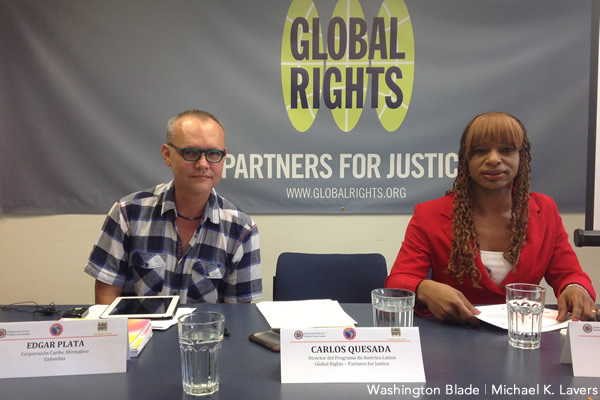
Edgar Plata of Caribe Afirmativo and Alondra Márquez of Santamaría Fundación take part in a panel on anti-LGBT violence at Global Rights in Northwest D.C. on Aug. 22, 2013. (Washington Blade photo by Michael K. Lavers)
Caribe Afirmativo Director Wilson Castañeda told the Blade on Thursday that Colombian political parties have yet to include gay-specific issues in their platforms. He added LGBT Colombians who seek to enter politics lack support and money for their campaigns and face what he described as the traditional political class that “functions more like electoral businesses than an ideological process.”
Castañeda added he feels working with the media to create visibility for LGBT Colombians is also important.
“It is important to immediately begin to generate synergies with the parties; with the current elected officials to ensure they, without being LGBT, are open to the idea,” Castañeda said.
Gay and Lesbian Victory Institute President Chuck Wolfe, who spoke on a panel during the Bogotá training, applauded the Cartagena gathering and the LGBT Global Development Partnership.
“This groundbreaking training puts into action the U.S. government’s commitment to global LGBT equality,” he told the Blade. “We are excited to work with our partners in-country and at USAID to grow the domestic participation of the LGBT community in Colombia.”
District of Columbia
Organizers announce details for D.C. Black Pride 2024
Most events to take place Memorial Day weekend at Westin Downtown
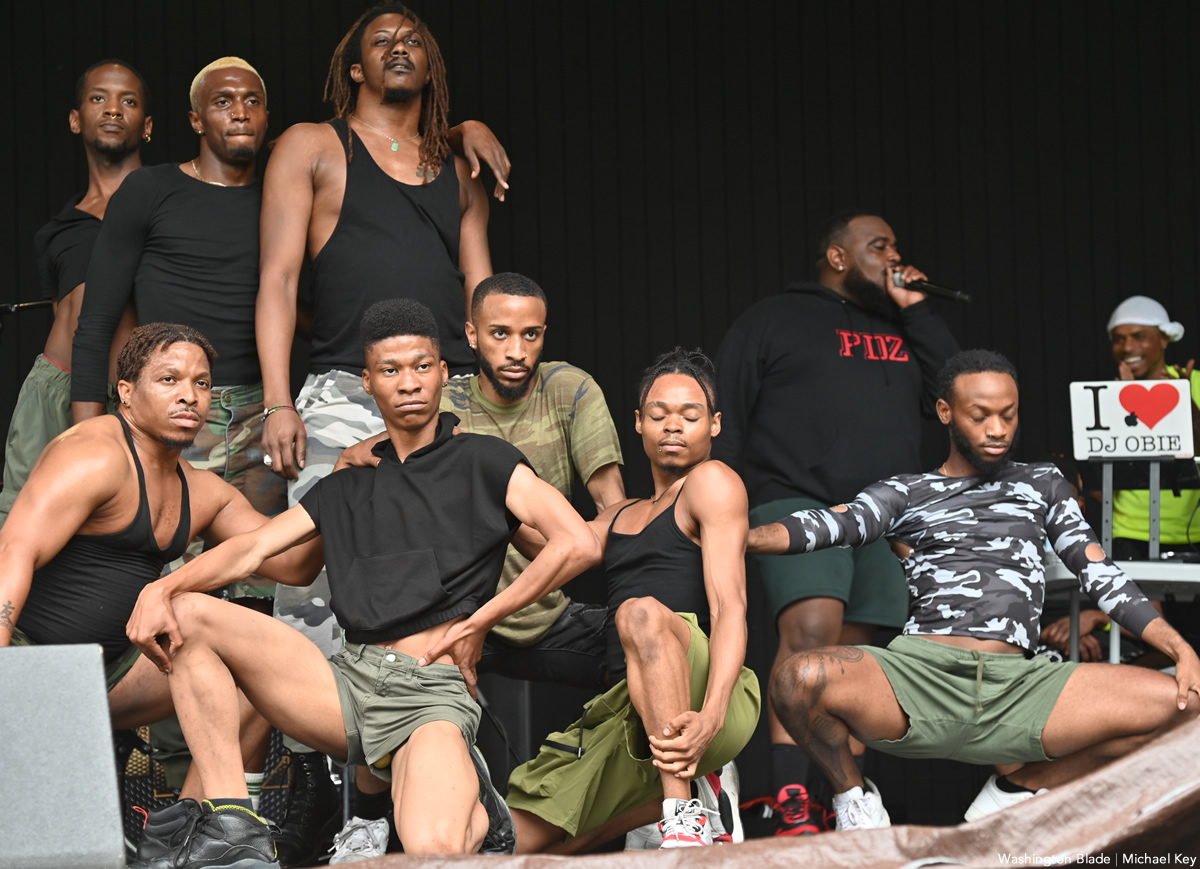
The Center for Black Equity, the organizer of D.C. Black Pride, the nation’s first and one of the largest annual African-American LGBTQ Pride celebrations, announced this year’s event will take place Memorial Day Weekend from May 24-27.
The announcement, released April 16, says that most 2024 D.C. Black Pride events will take place at the Westin Washington, D.C. Downtown Hotel at 999 9th St, N.W.
“With the theme Black Pride Forever, the event promises a weekend filled with vibrant celebrations, empowering workshops, and a deep exploration of Black LGBTQIA+ history and culture,” the announcement says.
It says events will include as in past years a “Rainbow Row” vendor expo at the hotel featuring “organizations and vendors created for and by the LGBTQIA+ community” offering products and services “that celebrate Black excellence.”
According to the announcement, other events include a Health and Wellness Festival that will offer workshops, demonstrations, and activities focused on “holistic well-being;” a Mary Bowman Poetry Slam “showcasing the power and beauty of spoken word by Black LGBTQIA+ artists;” the Black Pride Through the Decades Party, that will celebrate the “rich history of the Black LGBTQIA+ movement;” and an Empowerment Through Knowledge series of workshops that “delve into various topics relevant to the Black LGBTQIA+ community.”
Also, as in past years, this year’s D.C. Black Pride will feature its “Opening Night Extravaganza” reception and party that will include entertainment and live performances.
The announcement notes that D.C.’s annual Black Pride celebration, started in 1991 as a one-day outdoor event at Howard University’s Banneker Field, has inspired annual Black LGBTQ Pride events across the United States and in Canada, United Kingdom, Brazil, Africa, and the Caribbean. More than 300,000 people attend Black LGBTQ Pride events each year worldwide, the announcement says.
Full details, including the official schedule of events, can be accessed at dcblackpride.org.
Indiana
Drag queen announces run for mayor of Ind. city
Branden Blaettne seeking Fort Wayne’s top office

In a Facebook post Tuesday, a local drag personality announced he was running for the office of mayor once held by the late Fort Wayne Mayor Tom Henry, who died last month just a few months into his fifth term.
Henry was recently diagnosed with late-stage stomach cancer and experienced an emergency that landed him in hospice care. He died shortly after.
WPTA, a local television station, reported that Fort Wayne resident Branden Blaettne, whose drag name is Della Licious, confirmed he filed paperwork to be one of the candidates seeking to finish out the fifth term of the late mayor.
Blaettner, who is a community organizer, told WPTA he doesn’t want to “get Fort Wayne back on track,” but rather keep the momentum started by Henry going while giving a platform to the disenfranchised groups in the community. Blaettner said he doesn’t think his local fame as a drag queen will hold him back.
“It’s easy to have a platform when you wear platform heels,” Blaettner told WPTA. “The status quo has left a lot of people out in the cold — both figuratively and literally,” Blaettner added.

The Indiana Capital Chronicle reported that state Rep. Phil GiaQuinta, who has led the Indiana House Democratic caucus since 2018, has added his name to a growing list of Fort Wayne politicos who want to be the city’s next mayor. A caucus of precinct committee persons will choose the new mayor.
According to the Fort Wayne Journal Gazette, the deadline for residents to file candidacy was 10:30 a.m. on Wednesday. A town hall with the candidates is scheduled for 6 p.m. on Thursday at Franklin School Park. The caucus is set for 10:30 a.m. on April 20 at the Lincoln Financial Event Center at Parkview Field.
At least six candidates so far have announced they will run in the caucus. They include Branden Blaettne, GiaQuinta, City Councilwoman Michelle Chambers, City Councilwoman Sharon Tucker, former city- and county-council candidate Palermo Galindo, and 2023 Democratic primary mayoral candidate Jorge Fernandez.
District of Columbia
Trans woman files bias complaint against D.C. homeless shelter
Says staff forced her to stay in male sleeping section
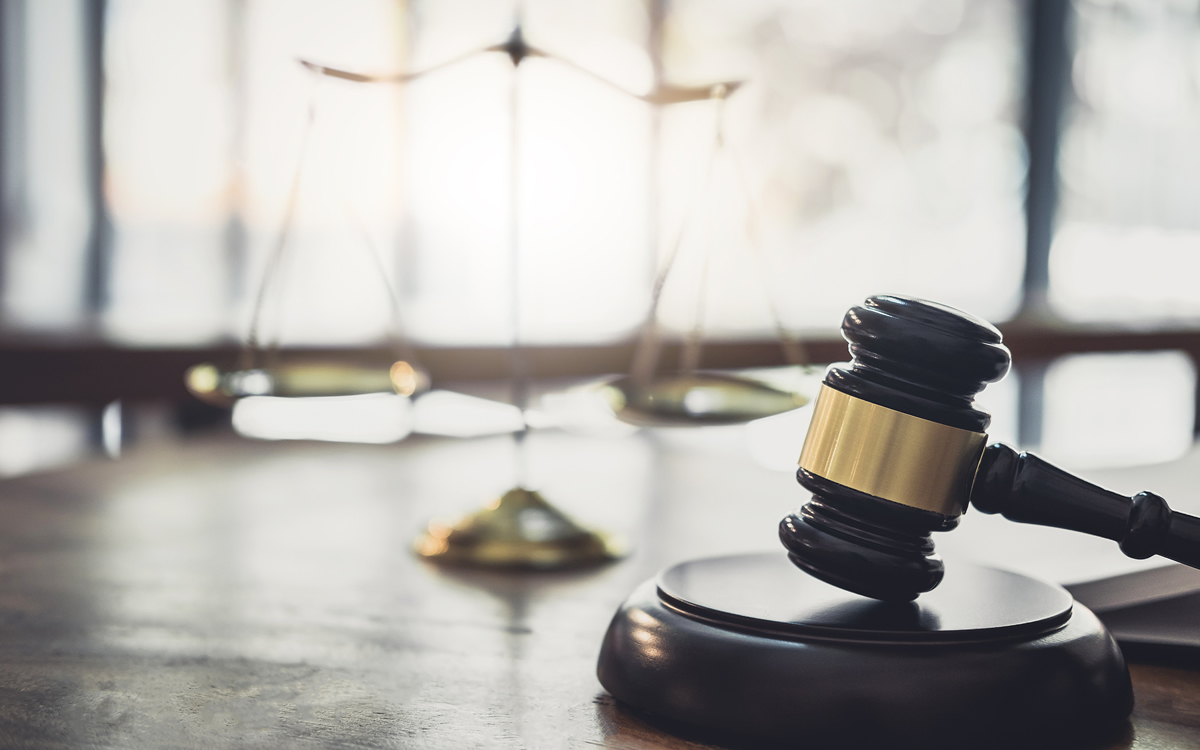
A transgender woman has filed a discrimination complaint with the D.C. Office of Human Rights charging that officials with the Community for Creative Non-Violence homeless shelter refused to allow her to stay in the women’s section of the shelter, forcing her to stay in the men’s sleeping section.
The shelter, located at 425 2nd St., N.W., is one of the city’s largest privately operated homeless services facilities organized by the Community for Creative Non-Violence, which is known as CCNV. It was founded by nationally acclaimed homeless services advocate Mitch Snyder, who passed away in 1990.
The complaint, filed last week by Stephon “Lashawn” Jordan, states that Jordan and a cisgender female friend arrived at the CCNV shelter around 2:30 a.m. on March 22 after they obtained a ride to the shelter through the city’s Emergency Shelter Hotline.
“Upon arrival we were informed that we would have to complete an intake once upstairs at the female housing unit,” Jordan states in the complaint. “Once we arrived a staff member came out. The staff member stated to me that we don’t house transgender individuals in this unit and that I would have to go down to the male shelter unit,” the complaint says.
It says Jordan’s female friend told the staff member she was not going to leave her friend, who identifies as female, by herself in another location at the shelter. “The staff member did not want to hear it and said that both of you can go downstairs too,” the complaint says. “Once we got downstairs to the male shelter unit we asked to speak with a supervisor,” it says.
“Someone came, but the decision was that myself and my friend could go and sleep in the male housing unit,” the complaint states. “During our stay it was very humiliating especially using the restroom,” it concludes.
A spokesperson for the CCNV shelter did not immediately respond to a phone and email message left by the Washington Blade asking for a response to the complaint.
Transgender rights advocates, including D.C. trans activist Earline Budd, who assisted Jordan in filing the complaint, have said the denial of placement of a transgender woman in the female section of a place of public accommodation such as a homeless shelter is a violation of the D.C. Human Rights Act’s ban on gender identity discrimination.
The Office of Human Rights website explains that under its policy for responding to discrimination complaints, the complainant and the accused party are required to enter mediation to determine if the complaint can be resolved. If the mediation fails, the OHR website statement says, a full investigation is conducted that can take up to six months to complete. It says upon completion of the investigation, the office makes a determination of whether probable cause exists that discrimination occurred.
If probable cause is found, the case is sent to the D.C. Commission on Human Rights, which holds a public evidentiary hearing with witnesses before making a final decision on whether discrimination occurred.

